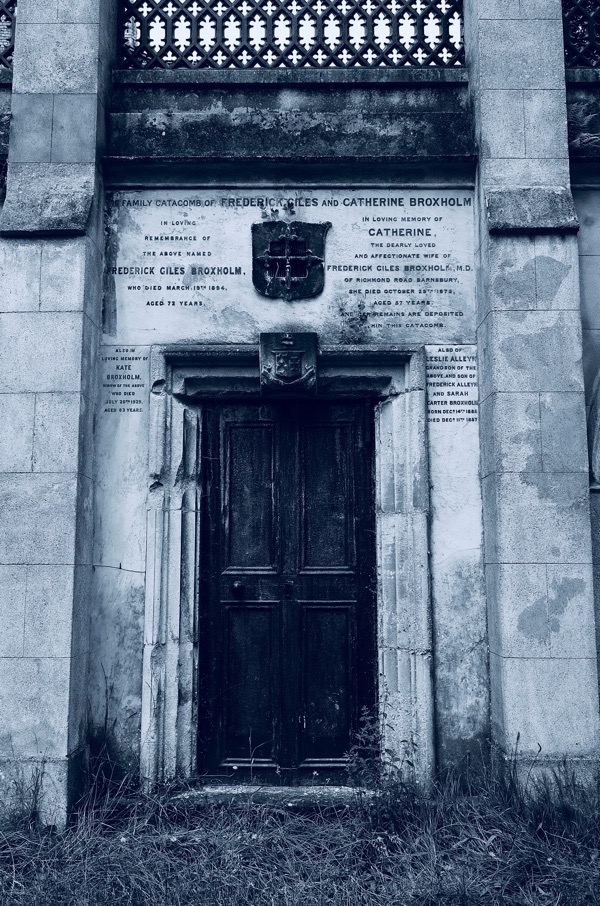At Highgate Cemetery

If you seek to lose yourself in London and escape the scorching summer heat, Highgate Cemetery is the ideal destination. You step through the gothic-inspired gatehouse and take the winding path up the hill among the trees, with gracious architectural monuments, tombs and statues on either side. Foliage and shadow enclose the cemetery, shielding it from the city.
At the top of the hill you arrive at a grand entrance with exotically carved stone pillars and iron gates, hung with dense growth of ivy and creepers. You encounter deep shadows at the portal and, unavoidably, confront your own mortality. As you ascend the shady path alone towards the light, lined with doors, it is as if you are entering the ancient metropolis of a lost civilisation. But the residents have not fled, they are all still here under the permanent lockdown of death.
You wonder what you will find at the other end of this passageway. Yet you emerge again into the light to discover a narrow street of doorways leading to the left and the right, open to the sky and lined with flowers. As you pace around, you recognise that each one is subtly distinct from the others, with names to enable the holy postman. Within minutes, you discover this street is circular. You have arrived at the heart of the necropolis and you can walk for eternity around this street. You can change direction, but you can only travel in a circle.
Thank goodness there are stairs that permit you to escape and return to the world of the living, where you can stand and impassively observe this curious architectural feature at the heart of the cemetery. If you seek the soul of London, you will find it here in the rotunda at Highgate Cemetery.























Highgate Cemetery, Swain’s Lane, London N6 6PJ
You may also like to read about
















Witnessing the profound loss in health, the environment, and social norms of the past few years, I can understand how building beautiful structures could help people find solace in their bereavement.
Have you read „The Graveyard Book“ by Neil Gaiman?
C.
Pterry ( T Pratchett )
“Cemeteries are for the Living”
Superb introduction and photographs – thank you
I love your image of Menagerist George Wombwell, with his favourite ‘pet’ / exhibition, a lion called Nero.
On a connected note, have you seen the site of the famous bare-knuckle pugilist, Tom Sayer, with his dog, Lion, faithfully resting on top?
Sayer’s funeral, attended by over 1,000 with a 2 mile cortège.
Karl Marx’s funeral, in the opposite site of East Cemetery, was reportedly attended by no more than 30.
What lovely sepia tinted photos.
Sadly, have never visited, hope to rectify one day.
Send my respect to the great Karl.
So many interesting and infamous people buried in this labryrinthine wonderland.
What a marvelous cemetery. thank you, dear G.A. By the way, in response to the previous comment from Sebastiaan Eldritch-Böersen about Karl Marx’ funeral: very few people came because his death was not reported for two days and as having taken place in Paris.
I want to look at these glacial photos on a HOT day — I expect they will bring my temperature right down. Wonderfully atmospheric.
By coincidence, I drove around to our local rural cemeteries yesterday. Our small hamlet has at least seven of them. The pocket-sized ones are “family” plots — some carefully tended and groomed / some of them wild and off-hand with grave stones propped up against tree trunks. Our jewel is the so-called Ancram Free ground Cemetery that has been restored by local volunteer hands. A Revolutionary War soldier rests there. Here.
Thank you, GA, for shining a light.
The use of black & white photos here lent atmosphere to your piece, yet the West side which you have presented here; as is the East are absolutely beautiful in colour. The light breaking through the tree canopy and bouncing off the marble; the flowers and wildlife all brimming with life. It is an oasis of calm and beautiful architecture being taken over by nature. The West side when I went was exclusively by ticket. I see now they are less restrictive. Do stick though to the beaten path, things are crumbling and decaying and you don’t wish to find your foot and leg in someone’s grave by wandering off the path. I encourage every one to visit both sides and wander at your leisure. One of the Magnificent Seven.
Wherever I go on my travels I try to visit a graveyard as they are a fascinating snapshot of social history. I can recommend the one next to the Gallery of Modern Art at Dean Village in Edinburgh (walking distance of Haymarket Station). One of the most interesting I have been to was in Copenhagen, it was organised into a street system with boards telling you who was buried in each street. I had never seen that type of layout before.
Thank you for bringing us these wonderful pictures of a favourite London landmark and Yes ! those who talk so grimly about being “locked down” should put their situation into perspective.
On a different note as someone who worked almost opposite Highgate Cemetery for a while in the 80’s I observed a marked change in the nature and style of visitors over this period. During the 80’s there was a regular flow of broad shouldered Russians wearing long belted raincoats and Astrakhan hats with a hammer and sickle badge pinned in their lapel and camera in their hand. In the 90’s this style of visitor rapidly declined .
I liked the horsie.
So much more evocative in b&w – terrific photos
I’d like to live there.
Very Beautiful Story